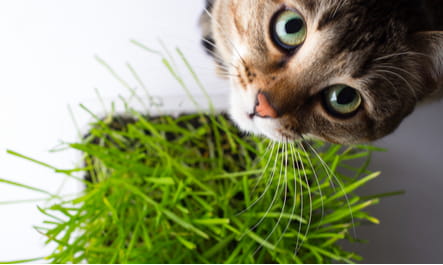
If your cat is insatiably eating the grass, eating large amounts every day for more than seven days in a row, is still stick after vomiting, or does not want to eat normal food, then take it to a vet.
Otherwise, there’s no need to worry about your cat eating grass every day; it’s normal behavior.
One of the least understood habits of cats is their tendency to “graze.” Understandably, when you see your cat eating grass every day, it could cause you major concerns, questions, and confusion.
To add to your confusion, you will stumble upon conflicting answers on the internet on the possible reasons for your cat’s strange behavior. Fortunately, in this article, I am going to answer why your cat is eating grass every day.
Please read here full the full on for the full information.
Cats like to eat grass both in the home and outside, you should not worry about this behavior. They eat grass for a variety of reasons, but usually to improve their digestive system. This is their way for them to get rid of toxic or foreign objects in their stomach.
There’s no evidence suggesting that eating grass can harm your cat. In fact, many experts believe that cats do this for their own benefit. Below is a list that explains it more elaborately.
Top Reasons Why Your Cat Eats Grass:

- To Relieve an Upset Stomach
If your cat vomits shortly after eating the grass, chances are, it’s doing it in purpose. Because cats don’t have essential enzymes that will help them digest a large amount of grass, it makes them sick and throw up. But as your cat throws up, you might see that it also throwing up fur, dirt, and other parasites from its stomach.
In other words, this is your cat’s way to get rid of the irritants from its digestive tract, which can cause an even more lasting disease.
- To Improve their Diet
Another possible reason as to why your cat might be eating grass for consecutive days is because it is trying to deal with a dietary deficiency in its body.
The juice found in the grass has folic acid, which is a vitamin that supports your cat’s nutrition and helps boost the oxygen levels in its blood.
- To Absorb Natural Laxative
Cats love licking their bodies – this is a normal habit they do to clean debris from their coats. And yes, it means that debris along with their hair, go straight to their stomachs as they do it. This, in turn, causes stomach discomfort and constipation.
But luckily, your cat is smart enough to treat itself from this problem. Eating grass serves as a natural laxative to ease their digestive systems. This aids them in having regular bowel movements. Certain types of grass add fiber to their diet, helping them pass fur or worms through their intestinal tract.

But My Cat Eats Grass Every Day, Should I Worry?
To make sure that your cat is consuming grass in a healthy amount. These are the questions you should ask yourself:
- Does my cat eat grass insatiably?
- Does it feel sick after vomiting?
- Is there any certain pattern on when or how your cat eats grass?
If your answer to the first two questions is YES, then you might consider taking your cat to the vet; otherwise, your cat should be good. But either your answer is yes or no. Question number 3 is something you have to pay attention to.
Eating grass can be considered normal for cats, and can’t generally harm them. However, if your cat eats grass every day – say, for more than 7 days – or consumes it in a large amount, then you might want to take it more seriously and bring your cat to the vet.
You should also be alarmed if you see that your cat is too obsessed with munching on grass that it becomes uninterested in eating its normal food.
Another thing is when your cat eats grass and vomits it with blood. This might indicate that it has ingested toxins or chemicals that might be harmful to your cat and requires immediate medical attention. When this happens, run to the vet immediately!
What Vets Do to Your Cat During a Visit?
As with any vet visit, your vet is likely to perform a wellness examination on your cat. With this process, they will be able to tell if your cat developed medical problems due to its grass consumption.
Your vet will also be able to tell if this behavior is a symptom of a minor sickness,a more severe condition, or it’s just a normal but weird habit of your cat.
Usually, your vet will start with the simplest form of examination, moving on to the more crucial, invasive ones if necessary. This all depends on your cat’s condition.
Here are the processes commonly done by a vet to evaluate your cat’s condition in random order:
- Abdominal ultrasound
- Barium study
- Blood work
- CT scan
- Endoscopy with biopsies
- Exploratory laparoscopy with biopsies
- Fecal examination
- Urinalysis
- X-rays
It’s very rare for grass-eating that animals to need an exploratory laparoscopy, which is a process that surgically checks what’s inside that cat’s abdomen. Same thing as the biopsy on the gastrointestinal tract. However, some severe symptoms may theoretically force a vet to see these more critical procedures as the best option.
Important Things to Keep in Mind When You See Your Cat Eating Grass?
Now, you know that your cat’s occasional grass consumption is something that shouldn’t cause concern. But then again, there are still some important things you want to keep in mind to make sure that your cat is doing it in a safe manner.
- Make Sure the Grass Has No Pesticide
If you’re letting your cat roam around your garden, you want to make sure that you don’t use insecticides or herbicides on your grass or plants.
Even if you stopped using them for a while, remember that most lawn pesticides are intended for long-lasting activity, and a lot of chemicals will stay active for a long time. This means that they may last for months or more than a year.
- Make Sure Your Cat is Not Eating Toxic Plants
As much as possible, make sure to check your garden for foreign plants that might be toxic for your cat. When consumed, toxic plants may lead to stomach discomfort, or worse, death.
Here are some of the most common plants that could be toxic to your cat; make sure that you don’t have them anywhere near your cat, whether it is an indoor or outdoor cat.
- Amaryllis (Amaryllis spp.)
- Autumn Crocus (Colchicum autumnale)
- Azaleas and Rhododendrons (Rhododendron spp.)
- Castor Bean (Ricinus communis)
- Chrysanthemum, Daisy, Mum (Chrysanthemum spp.)
- Cyclamen (Cyclamen spp.)
- Daffodils, Narcissus (Narcissus spp.)
- Dieffenbachia (Dieffenbachia spp.)
- English Ivy (Hedera helix)
- Hyacinth (Hyacinthus orientalis)
- Kalanchoe (Kalanchoe spp.)
- Lily (Lilium sp.)
- Lily of the Valley (Convallaria majalis)
- Marijuana (Cannabis sativa)
- Oleander (Nerium oleander)
- Peace Lily (Spathiphyllum sp.)
- Pothos, Devil’s Ivy (Epipremnum aureum)
- Sago Palm (Cycas revoluta)
- Spanish Thyme (Coleus amphibious)
- Tulip (Tulipa spp.)
- Yew (Taxus spp.)
- Consider Growing Your Grass

If you are living in a neighborhood surrounded by grass and plants, then it might get more challenging to make sure your cat is only consuming grass that wouldn’t put them in a predicament.
And sometimes, even
though you don’t use pesticides on your lawn, there might still be chemical
drift. Wind can bring over chemicals from treated lawns to
travel up to 50 feet away. This means that even though you don’t
treat your grass with pesticide, if anyone on your neighborhood does,
your lawn might still have those chemicals.
So, in this case, you might want to have grass for them inside your house that will be safe for your cat to eat. You can get cat grass seeds at most pet stores to grow a couple of pots or indoor garden beds.
The Best Grass to Grow for Your Cat
With the reasons mentioned above, you can tell that there’s really no reason to stop your cat from eating grass. However, you could be concerned about the type of grass or plants your cat is consuming.
While most types of grass you can find in a pet store are a great choice, one of the best types is alfalfa grass. This is because it’s known to help prevent and treat kidney disease in cats.
Another great choice is the oats. The reason for this is because it acts as a digestive aid that helps cats calm their intestinal tract. It is also high in soluble fiber, protein, manganese, iron, B vitamins, and zinc.
You can also grow catnip if you truly want to please your cat! By doing this, you’re not only making your cat happy, you’re also making your home more pleasant and fresh!
For specific questions about your pet’s diet, always consult with your veterinarian.
Final Words
While eating grass might rather seem very unappealing, a lot of cats love it, and instead of being harmful, it’s actually beneficial to them. On top of that, they barely eat more than occasional small amounts.
However, if your cat is eating grass every day, they might be prone to intestinal pain that must be addressed to the vet.
When you see your cat – whether if it is indoor or an outdoor cat – is eating grass, it’s better to allow it but monitor how he does it and what exactly he is eating.
It’s also important to make sure that your cat is not eating grass that is chemically treated. And if you have an outdoor cat, consider growing grass inside your house to give yourself peace of mind.
Contributor: Cyril Balahadia

Sources:
https://www.purina.com/articles/cat/behavior/why-cats-graze
https://www.quora.com/Why-does-my-cat-eat-grass-every-day-then-throw-up-Is-that-okay
http://www.animalplanet.com/pets/why-do-cats-eat-grass/
https://www.smithsonianmag.com/smart-news/researchers-figure-out-why-cats-eat-grass-180972885/
http://www.vetstreet.com/care/my-pet-wont-stop-eating-grass-whats-going-on
https://www.animalfriends.co.uk/pet-advice/cat-advice/why-do-cats-eat-grass/
https://www.petfinder.com/cats/cat-grooming/cats-meticulous-nature/
https://www.petmd.com/cat/emergency/poisoning-toxicity/e_ct_poisonous_plants
https://www.petmd.com/cat/conditions/digestive/c_ct_exocrine_pancreatic_insufficiency
https://vcahospitals.com/know-your-pet/wellness-examination-in-cats
https://www.purina.com.au/cats/care/toxic-plants
https://www.aspca.org/pet-care/animal-poison-control/toxic-and-non-toxic-plants
https://legacyivf.com/wheatgrass-and-fertility-is-there-a-connection/
https://www.drugs.com/cg/exploratory-laparoscopy-inpatient-care.html